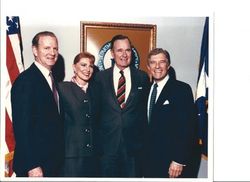
At that time Houston was just starting to flex its political muscle as the center of the oil industry. It was building architectural wonders as great as technology is building today – what is Apple’s “flying saucer” headquarters but a Ringworld version of the Astrodome?
To those accusing tech moguls today of living in “a bubble,” allow me to welcome you to River Oaks, Houston, circa 1976. Let me introduce you to people like Robert Mosbacher (here with George H.W. Bush, Jim Baker, and his then-wife Georgette), to the heirs of Sid Richardson, or to the partners at Vinson & Elkins, to the great and the good of the oil industry during that time.
They lived in a constant state of luxury, on private jets, and while for many years they had sought to be left alone, they had recognized by this time this was impossible.
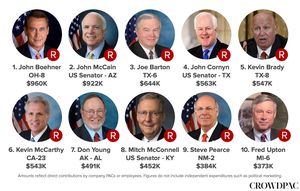
So oil stepped up to its responsibility, as it saw it. It put in the money to get what it needed from Washington and, eventually, what it wanted. It made the country, and to a great extent, the world, in its image. Texas’ shit didn’t stink because money came out of the ground. Without oil, Texas is Arkansas. Their partners in Saudi Arabia felt the same way. Where was Egypt’s oil?
When Google’s founders created their cute slogan “don’t be evil” a decade ago, it really meant “trust us,” and “we know best,” as well as “leave us alone.” It was a plea to society, an agreement, that if technology were allowed to work its will that the world would be a better place.
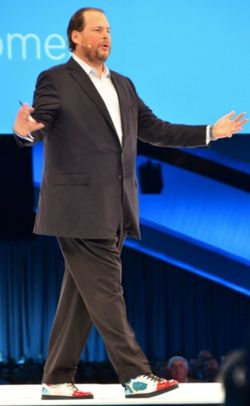
The future that looks so bright in TechLand is a dystopia to Trumpistan. New businesses are not being born there, because who would fund them, or patronize them? The elite of every small town is becoming an app. The economic and social power the town’s real estate agents, lawyers, insurance people and car lots once held is now in the palm of their former customers’ hands. The income that once drifted into town, in the form of commissions and other fees earned by overcoming market friction by pushing paper, is now going to a bunch of geeks whose apps do it in the cloud.
This is now a direct threat to the technology industry. Technology’s progress has created enemies – vast armies of enemies. They have legitimate grievances. They have been left high-and-dry by the forces of technological and economic change, and they had no warning of it. The kids they thought would inherit their world are now competing for college spots against scions of Indian and Chinese wealth, and losing.
Tech doesn’t get it. The one thing they’ve lobbied for during this Administration is for the so-called H1-B Visa, which lets them directly import talented people from anywhere in the world, and put them right to work, rather than educate and train Americans for those jobs.
With every generation, new elites are formed, and old elites are thrown on the fire. The age of manufacturing is now in the distant past, and if it ever rises again it will be because machines are doing most of the work. In Houston, Exxon executives know that solar panels and wind farms are coming for their children, that self-driving cars are going to eliminate still more jobs, and they see an opportunity.
The opportunity is to overturn the future through politics.
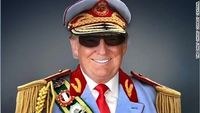
He directly threatens technology. Boycott Apple, he says. Tax Amazon, he says. He’s going to go after Google, after Facebook, and after Marc Benioff’s Salesforce.com. Donald Trump is no joke. He is an existential threat to the world technology has built these last 40 years, and that it is building.
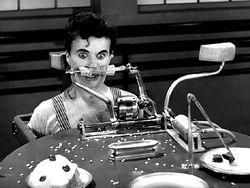
Every rising industry finds its own moment of truth, the point where it can no longer rely on politics to shine on them, where it must seize power or go down. The secret of America is that it has always listened to these voices, always obeyed the call of the new over the cries of the old, and thus always moved ahead.
I suggested a few months ago that Sheryl Sandberg might make the perfect vice president for Hillary Clinton and I did it for this reason. Democrats and technology need one another. They’ve had a nice run these last eight years, with Barack Obama, but the barbarians are at the gate, and the Republicans are now their implacable enemies.
Sure, it’s a marriage of convenience, but what political marriage isn’t?









